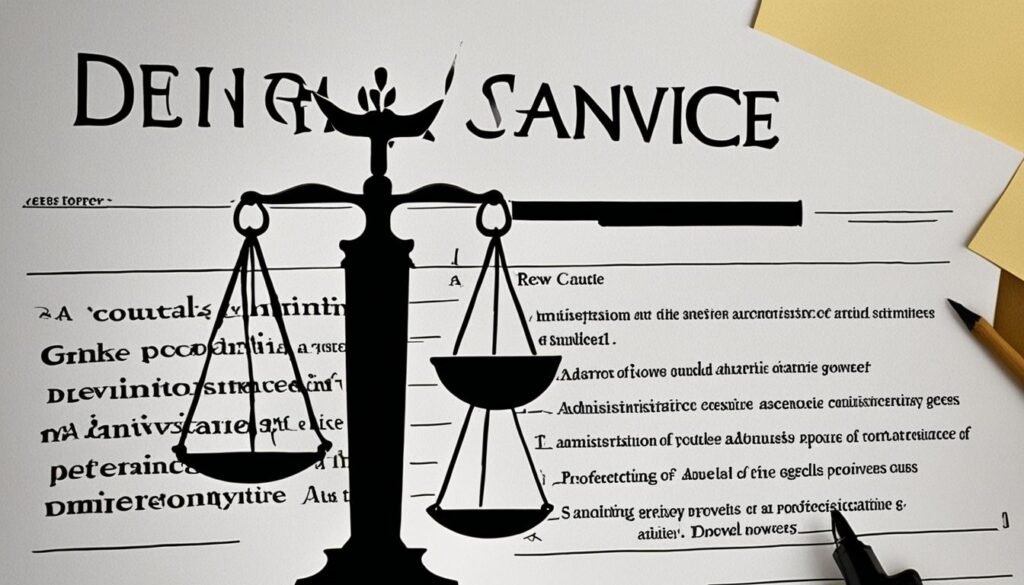Administrative law is a critical component of the legal system, governing the processes by which federal and state agencies implement and enforce laws enacted by Congress and state legislatures. This specialized branch of law plays a pivotal role in safeguarding the public interest, ensuring transparency and due process, and balancing the authority of government agencies with the rights of individuals and businesses.
At its core, administrative law refers to the branch of law that regulates the creation and operation of administrative agencies. These agencies, both federal administrative and state-level, are delegated power by the legislative branch to interpret, administer, and enforce federal and state statutes. The administrative procedure act provides the framework for how these agencies must operate, with a focus on maintaining federal law and protecting the public.
The agency rules and regulations promulgated by these federal administrative agencies have a significant impact on the daily lives of citizens and the operations of industries across the United States. Administrative law attorneys play a crucial role in navigating this complex landscape, leveraging their expertise in administrative power, administrative functions, and administrative decisions to ensure compliance with the law and protect the rights of their clients.
Understanding the importance of administrative law and the role of administrative law cases and administrative hearings is essential for anyone seeking to engage with the government or participate in the regulatory process. This specialized field of law serves as a critical bridge between legislative intent and real-world policy implementation, shaping the daily lives of citizens and the operations of industries across the United States.
Key Takeaways
- Administrative law governs the creation and operation of federal and state administrative agencies.
- Agencies are delegated power by Congress or state legislatures to interpret, administer, and enforce laws.
- The Administrative Procedure Act provides the framework for how agencies must operate, ensuring transparency and due process.
- Administrative law attorneys specialize in navigating the complex landscape of agency rules and regulations.
- Understanding administrative law is essential for engaging with the government and participating in the regulatory process.
Administrative Law: The Backbone of Government Regulation
Administrative law is a critical aspect of our legal system. It serves as the process by which federal agencies, state, and local governments implement and enforce laws enacted by Congress or state legislatures. This branch of law is activated when governmental bodies, whether part of the federal government or local entities, are required to convert legislative directives into enforceable regulations and policies.
Definition and Overview
Regulatory agencies are central to this process. Regulatory agencies can be either part of the executive branch or independent agencies, including high-profile entities such as the Federal Communications Commission (FCC) and the Securities and Exchange Commission (SEC), which regulate specific sectors such as telecommunications and financial markets, respectively. The role of regulatory agencies is pivotal in safeguarding the public interest by enforcing laws that reflect legislative intentions while adapting to the dynamic needs of the sectors they oversee.
The Necessity of Administrative Agencies
Administrative law is a critical aspect of our legal system. It serves as the process by which federal agencies, state, and local governments implement and enforce laws enacted by Congress or state legislatures. This branch of law is activated when governmental bodies, whether part of the federal government or local entities, are required to convert legislative directives into enforceable regulations and policies. Regulatory agencies are central to this process. Regulatory agencies can be either part of the executive branch or independent agencies, including high-profile entities such as the Federal Communications Commission (FCC) and the Securities and Exchange Commission (SEC), which regulate specific sectors such as telecommunications and financial markets, respectively. The role of regulatory agencies is pivotal in safeguarding the public interest by enforcing laws that reflect legislative intentions while adapting to the dynamic needs of the sectors they oversee.
The Structure and Powers of Administrative Agencies

Administrative agencies act as specialized task forces, each with a specific mandate. They range from the well-known agencies such as the Social Security Administration (SSA), to industry-specific bodies such as the Occupational Safety and Health Administration (OSHA). Administrative agencies can also be referred to as boards, departments, or commissions, each playing a pivotal role in administering specific aspects of law.
Executive Agencies vs. Independent Agencies
Some textualist scholars argue that administrative agencies are unconstitutional, particularly because of the arguably unconstitutional delegation of law-making power. Nonetheless, the current jurisprudence in administrative law deems agencies constitutional, and necessary in the current society in a functional and pragmatic sense. Indeed, because Congress cannot enforce and administer every law it enacts, it must rely on the agencies to administer, interpret, enforce, and otherwise regulate various federal laws that Congress has enacted. Some of the most notable agencies are the executive agencies such as the Department of Justice and Department of Defense. Other examples include some independent agencies such as the Federal Trade Commission, Securities and Exchange Commission, and the Environmental Protection Agency, all of which are independent from the direct control of the President.
Delegated Authority and Rulemaking
Administrative agencies are granted authority by Congress (or in the case of a state agency, the state legislature) to act as agents responsible for carrying out certain prerogatives from Congress. Agencies are created through their own organic statutes, which establish new laws, and in doing so, create the respective agencies to interpret, administer, and enforce those new laws. This delegated authority allows administrative agencies to engage in rulemaking, where they develop and promulgate regulations to implement the laws passed by the legislative branch.
Administrative Procedure Act: Ensuring Transparency and Due Process

The Administrative Procedure Act (APA) is the major source for federal administrative agency law, while state agencies’ administration and regulation are governed by comparable state acts. The APA is a remedial statute designed to ensure uniformity and openness in the procedures used by federal agencies. The Act is comprised of a comprehensive regulatory scheme governing regulations, adjudications, and rulemaking in general terms.
Formal and Informal Rulemaking
Under the federal APA and judicial interpretations of the APA, agencies purporting to engage in the rulemaking function must give notice of proposed rulemaking before adopting the final rule. The final rule must follow a logical outgrowth of the proposed rule and must display the agencies’ consideration of all comments received and reviewed.
Adjudication and Administrative Law Judges
In its adjudicatory functions, the agencies often have their own judicial body, known as the Administrative Law Judge, who are part of their respective agency, but must be independent from the agency officials involved in certain actions. The administrative law judges are to adjudicate claims or disputes involving the agency, as an impartial trier of fact and law, and are prohibited by APA from engaging in any ex parte contact with the agency, unless upon notice and opportunities to all parties involved in the proceeding.
Guidance and Interpretive Rulings
Finally, the agencies have much fewer procedural limitations in its guidance actions, where the agencies can issue interpretive rulings or guidance letters explaining its stance on certain rules, etc., but without the force of law.
Administrative Law in Daily Life

Administrative law is an integral part of our daily experiences. Engaging with federal regulations, individuals encounter administrative laws when they interact with federal agencies like the Social Security Administration (SSA) for benefits or services. These interactions are governed by a complex framework of federal rules and regulations, affecting various societal aspects.
Engagement with Federal Agencies
From navigating the procedures of the SSA to obtaining necessary permits and licenses, administrative law shapes our everyday interactions with government agencies. The decisions and actions of these agencies, whether federal or state, are guided by a comprehensive set of administrative rules and regulations that impact the lives of citizens and businesses across the United States.
Environmental and Workplace Regulations
Administrative law also plays a critical role in ensuring workplace safety and upholding environmental standards. Federal agencies like the Occupational Safety and Health Administration (OSHA) and the Environmental Protection Agency (EPA) are tasked with enforcing regulations that protect the well-being of workers and the general public. These agency rules and decisions directly influence how individuals and businesses operate, making public participation in the rulemaking process a vital aspect of democratic governance.
Industry Regulation and Administrative Law

Administrative law plays a pivotal role in industry regulation through the enforcement of federal laws and regulations by administrative agencies.
Agencies like OSHA not only ensure workplace safety but also enforce federal standards that protect employee rights and wellbeing. Similarly, the EPA implements federal environmental laws that have far-reaching impacts on industries ranging from manufacturing to agriculture. These regulations are often the result of a detailed process where proposed rules are debated and refined before becoming enforceable standards.
Compliance with Federal Standards
Understanding the details of these regulations is essential for businesses and professionals in all sectors, as compliance with these federal rules can have significant legal and operational implications. Failure to adhere to OSHA or EPA regulations, for instance, can result in costly fines and even legal action against the offending organization.
Agency Enforcement and Adjudication
Administrative law forms the framework of a regulated society, where federal agencies play a crucial role in maintaining industry standards and protecting public interests. These agencies are empowered to enforce their regulations through various means, including inspections, investigations, and administrative adjudication. The administrative process allows agencies to identify violations, impose penalties, and adjudicate disputes, all within the bounds of established administrative law.
Navigating the complex web of federal regulations and agency oversight requires a deep understanding of administrative law. Businesses and professionals must stay informed about the latest developments in their respective industries, ensuring compliance with evolving rules and regulations enforced by agencies like OSHA and the EPA. By upholding these standards, industries can maintain public trust and contribute to the overall well-being of the nation.
Judicial Review and Deference Standards

One important aspect of administrative law is the judicial deference given by the courts to the agencies. The U.S. Supreme Court has established three different levels or standards of judicial deference in three landmark cases: Chevron U.S.A., Inc. v. NDRC, 467 U.S. 837 (1984); Auer v. Robbins, 519 U.S. 452 (1997); and Skidmore v. Swift, 323 U.S. 134 (1944).
Chevron Deference
Under Chevron deference, the courts apply an extremely deferential standard of review, in which the courts defer to agency interpretations of such statutes unless they are unreasonable. This level of deference acknowledges the expertise and authority of administrative agencies in interpreting the laws they are tasked with implementing.
Auer and Skidmore Deference
Under the Auer deference, courts defer to the agency interpretations of its own ambiguous regulations. Akin to the Chevron deference, the courts have that the agency’s interpretation of its own regulations are binding unless it is plainly erroneous or inconsistent with the regulation. If the Chevron or Auer deference do not apply, the Skidmore deference applies, in which the courts do not give a binding deference to the agency’s interpretation but give varying amounts of deference according to the agency’s expertise in the particular matter.
These judicial deference standards strike a balance between the authority of administrative agencies and the role of the federal courts in reviewing agency actions. They ensure that agencies can effectively interpret and apply the laws they are responsible for administering, while also providing a check on potential agency overreach or unreasonable interpretations.
Administrative Law and the Legal Profession

Navigating the maze of administrative law can be daunting, especially when confronting administrative law cases that involve interactions with the federal government. Lawyers specializing in this field must have a deep understanding of the legal framework governing administrative agencies, including their procedural rules and the implications of agency interpretations.
The Need for Administrative Law Expertise
Administrative law attorneys are particularly skilled in interpreting how federal laws and regulations apply in specific scenarios, a skill crucial for addressing issues like benefit denials or regulatory compliance challenges. These legal experts are experts in navigating the rulemaking process—from proposed rules to final rules—and can provide invaluable guidance in situations where judicial review of an administrative agency’s decision is necessary.
Administrative Courts and Processes
Administrative agencies are encouraged to establish their own judicial processes, creating a unique system that includes specialized courts and appeals processes. Lawyers in this field must have a comprehensive understanding of the procedural rules and the nuances of agency-specific judicial systems.
| Key Aspects of Administrative Law Expertise | Importance for Legal Professionals |
|---|---|
| Understanding agency procedures | Crucial for navigating complex administrative processes and achieving favorable outcomes for clients |
| Interpreting agency interpretations and regulations | Allows for effective application of federal laws and regulations to specific scenarios |
| Familiarity with administrative court systems | Enables lawyers to effectively represent clients in specialized administrative tribunals and appeals processes |
| Expertise in the rulemaking process | Provides guidance in situations requiring judicial review of agency decisions |
Administrative Law: Bridging Law and Policy

Administrative law is a critical link between law and policy. It involves administrative agencies, including both regulatory agencies and executive agencies in the process of turning legislative directives into detailed agency rules and regulations. The transformation of legislative directives to agency rules and regulations, which is overseen by agency heads and guided by enabling legislation, is pivotal to federal administrative law.
Administrative law judges play a key role in the process, ensuring that the interpretation and application of the rules are in line with legislative intent. The judges’ decisions help maintain the integrity of the law, ensuring that the practical application of policies aligns with the broader goals set by the legislature.
Balancing Power and Protecting Rights

In administrative law, a delicate balance is maintained between the authority of government administrative agencies and the rights of individuals and businesses. This balance must be upheld through mechanisms such as judicial review, which provides a check on the actions of administrative agencies. Judicial control ensures that agency decisions, including those of regulatory agencies, adhere to the principles of fairness and legal correctness.
Administrative law judges play a crucial role in mediating disputes, ensuring that the rights of individuals and businesses are protected against potential overreach by executive agencies. The balance is fundamental to a fair and just legal system and essential in preserving public trust in governmental institutions.
The Ever-Evolving Landscape of Administrative Law

The landscape of administrative law mirrors the ever-changing nature of society and technology. Administrative law continuously adapts to new challenges, requiring law students and practitioners to stay current with the latest developments in federal administrative law and the actions of administrative agencies. The ongoing changes in agency rules and the emergence of new regulatory areas require a commitment to lifelong learning and adaptation.
Additionally, the evolving interpretations by judicial bodies and the introduction of new legislation constantly reshape the boundaries and applications of administrative law. Staying up-to-date with these changes is crucial for effectively navigating the complex and ever-evolving field of administrative law.
| Aspect | Impact on Administrative Law |
|---|---|
| Regulatory Areas | Emergence of new regulatory domains requiring constant adaptation and rulemaking by administrative agencies. |
| Judicial Interpretations | Evolving court decisions that redefine the boundaries and applications of administrative law principles. |
| Legislative Changes | New laws and amendments that necessitate updates to agency regulations and procedures. |
| Lifelong Learning | Continuous education and adaptation required for law professionals to stay current with the dynamic field of administrative law. |
Also Read : Property Law: Rights And Responsibilities Of Owners
Conclusion
Administrative law is a critical component of our legal system, governing the processes by which federal and state agencies implement and enforce the laws enacted by Congress and state legislatures. This specialized branch of law plays a pivotal role in safeguarding the public interest, ensuring transparency and due process, and balancing the authority of government agencies with the rights of individuals and businesses.
Administrative agencies, both executive and independent, are central to this regulatory framework, wielding substantial power to interpret, administer, and enforce federal statutes. The Administrative Procedure Act and judicial deference standards provide the structure and boundaries within which these agencies operate. Administrative law also significantly impacts the legal profession, requiring specialized expertise to navigate the complex web of agency procedures, interpretations, and adjudications.
As society and technology continue to evolve, the landscape of administrative law remains in flux, necessitating a commitment to lifelong learning and adaptation. Ultimately, administrative law serves as a critical bridge between legislative intent and real-world policy implementation, shaping the daily lives of citizens and the operations of industries across the United States.
FAQs
Q: What is administrative law?
A: Administrative law is the body of law that governs the activities of administrative agencies of government. It includes rules, regulations, orders, and decisions issued by these agencies as they carry out their responsibilities.
Q: Why does administrative law matter?
A: Administrative law is important because it provides the framework for how government agencies operate and make decisions that affect individuals and businesses. It ensures accountability, transparency, and fairness in the regulatory process.
Q: What is the difference between federal administrative law and state administrative law?
A: Federal administrative law governs the activities of federal agencies at the national level, while state administrative law pertains to the regulatory activities of state agencies within a specific state.
Q: How are federal regulations published?
A: Federal regulations are published in the Federal Register, which is the official journal of the federal government that provides a complete and detailed outline of rules, proposed rules, and notices issued by federal agencies.
Q: What role do regulatory agencies play in administrative law?
A: Regulatory agencies have the authority to enforce regulations and oversee compliance in specific areas such as healthcare, environmental protection, and consumer protection. They are responsible for issuing rules, conducting investigations, and making decisions on administrative matters.
Q: How can an individual challenge an administrative decision?
A: Individuals can challenge an administrative decision through an administrative appeal process or by seeking judicial review of the agency’s actions. This allows for a higher court to review and potentially overturn the decision if it was arbitrary and capricious.
Q: What is the significance of judicial review in administrative law?
A: Judicial review is the process by which courts review the actions of administrative agencies to ensure they are consistent with the law and constitutional principles. It serves as a check on the power of agencies and protects the rights of individuals affected by administrative decisions.
Q: What is the role of an administrative law attorney?
A: An administrative law attorney specializes in representing clients in matters involving regulatory agencies, administrative hearings, and appeals. They provide legal guidance on navigating the complex regulations and procedures of administrative law.
Source Links
- https://www.law.cornell.edu/wex/administrative_law
- https://law.pepperdine.edu/blog/posts/understanding-administrative-law.htm
- https://www.justia.com/administrative-law/





